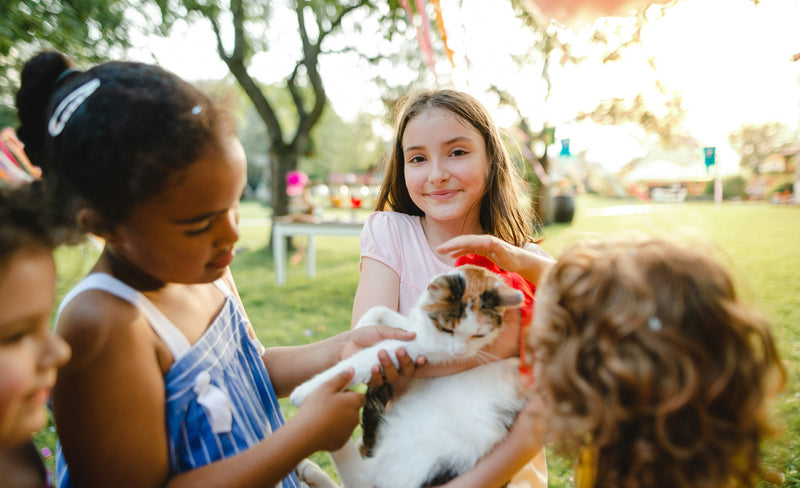
Furry Teachers: How Animals Help Children Learn Life's Most Important Lessons 🐾✨
Long before textbooks and classrooms, humans learned by observing the natural world around them. Today, in our increasingly digital age, animals remain some of life's most powerful teachers for children—offering lessons in empathy, responsibility, resilience, and emotional intelligence that no app or video can match.
The Unique Connection Between Children and Animals 💫
There's something almost magical about the relationship between children and animals. Researchers have found that children naturally attribute feelings and thoughts to animals, creating an instinctive emotional bridge that makes animals particularly effective teachers. This connection—sometimes called the "biophilia hypothesis"—suggests humans have an innate tendency to connect with other living beings.
The beloved characters in the My Furry Soulmates series tap into this natural connection, using animal protagonists to help children explore complex emotions and social situations in a way that feels both safe and engaging.
Seven Powerful Life Lessons Animals Teach Children 🌟
1. Unconditional Love and Acceptance 💕
A family pet doesn't care about grades, athletic ability, or social status. They offer the same enthusiastic greeting whether a child has had a triumph or a terrible day. This unconditional acceptance teaches children about love without prerequisites—a foundation for healthy relationships throughout life.
Children can explore and express these feelings of unconditional connection through the guided activities in the Confident Mindset Journal, which helps children recognize and appreciate relationships built on acceptance rather than performance.
2. Responsibility and Nurturing 🥄
Caring for an animal—whether a family pet, classroom fish, or backyard wildlife—teaches children that other living beings depend on their consistent actions. This early experience with responsibility lays the groundwork for understanding commitment and follow-through.
"When my daughter started feeding our cat each morning, I noticed she became more responsible about other tasks too. It was like she understood for the first time that her actions really mattered to someone else." —Parent of 8-year-old Emma
3. Empathy Development 🤗
Research shows that positive interactions with animals significantly increase empathy in children. By considering an animal's needs, comfort, and feelings, children practice perspective-taking—a cornerstone of emotional intelligence.
The stories in the My Furry Soulmates series leverage this natural empathy connection, featuring animal characters navigating emotional challenges that mirror children's experiences, helping young readers develop deeper understanding of both their own feelings and others'.
4. Nonverbal Communication 👁️
Animals communicate primarily without words, making them excellent teachers of body language and emotional cues. Children who learn to "read" an animal's signals—a wagging tail, flattened ears, or purring—develop greater sensitivity to nonverbal human communication as well.
The observation activities in the My Curiosity Mindset Journal help children develop these observation skills through guided nature watching and animal behavior documentation.
5. Resilience and Life Cycles 🦋
The natural world offers gentle but honest exposure to life's biggest truths. Whether observing a butterfly's metamorphosis, witnessing seasonal changes, or eventually facing the loss of a pet, animals help children understand life cycles, impermanence, and resilience in age-appropriate ways.
"When our classroom caterpillars emerged as butterflies, my students were in awe of the transformation. Later that year when we faced challenges, I could remind them: 'Remember the caterpillars? Sometimes the hardest changes lead to something beautiful.'" —2nd grade teacher
6. Mindfulness and Present-Moment Awareness 🧘♀️
Animals live completely in the present moment—a state humans often struggle to achieve. By observing and interacting with animals, children naturally practice mindfulness, learning to focus on the here and now rather than worrying about past or future.
The mindfulness exercises in both the Confident Mindset Journal and My Curiosity Mindset Journal build on this natural tendency, helping children develop present-moment awareness that improves focus and emotional regulation.
7. Acceptance of Differences 🌈
Animals come in endless varieties, each with unique characteristics and needs. This diversity teaches children to appreciate differences rather than fear them—a foundational lesson for creating an inclusive worldview.
The diverse animal characters in the My Furry Soulmates books model friendship and cooperation across differences, helping children develop appreciation for diverse strengths and perspectives.
How to Maximize Animal-Based Learning 🔍
Whether you have household pets, make regular nature observations, or connect through stories and imagery, here are ways to enhance the life lessons animals offer:
Ask Open-Ended Questions
"How do you think the bird feels when it's singing?" or "What might our dog be trying to tell us with that behavior?" These questions promote empathy and observation skills.
Make Connections Explicit
"You were so patient waiting for the butterfly to land, just like you're learning to be patient with your little brother." Helping children see parallels strengthens the lessons.
Use the Power of Stories
The animal characters in the My Furry Soulmates series face challenges similar to those children encounter, creating perfect opportunities to discuss emotions and social situations through the safe distance of animal characters.
Document Observations
The guided nature journaling activities in the My Curiosity Mindset Journal help children record and reflect on animal behaviors and characteristics, deepening their learning through documentation.
Process Feelings
Use the reflection prompts in the Confident Mindset Journal to help children process emotions that arise from animal interactions, especially the more challenging experiences.
The Science Behind Animal-Child Connections 🧪
Research increasingly supports what many parents and educators have observed:
- Studies show that children who have positive relationships with animals score higher on measures of empathy and social understanding
- Interaction with animals has been shown to reduce stress hormones and increase oxytocin (the "bonding hormone") in children
- Children with pets typically demonstrate greater responsibility, self-esteem, and emotional regulation
- Animal-assisted interventions show promising results for children with various emotional and developmental challenges
Creating Animal Connections Without Pets 🏠
Not every family can have household pets, but all children can benefit from animal connections:
- Regular nature observation walks to watch birds, squirrels, or insects
- Volunteer opportunities at animal sanctuaries or shelters (for older children)
- Library books and documentaries about animals, enhanced by discussion
- The richly illustrated animal stories in the My Furry Soulmates series, which bring animal wisdom to life for all children
- Animal-themed journaling prompts from the My Curiosity Mindset Journal that encourage empathy and observation
Wisdom from Our Oldest Teachers 🌳
In our rush toward technological advancement, we sometimes forget that the natural world has been teaching humans since the beginning of time. The quiet wisdom of animals—their presence in the moment, their authentic emotions, their resilience and adaptability—offers children something no digital experience can replicate.
By fostering meaningful connections between children and animals, whether through direct interaction or through thoughtfully crafted resources like the My Furry Soulmates series, we give children access to these ancient lessons in a form they naturally understand and embrace.
In a complex world where social-emotional skills matter more than ever, our furry, feathered, and scaled teachers might just provide the most important education of all.
Support your child's connection with animal wisdom through the My Furry Soulmates series, the Confident Mindset Journal, and the My Curiosity Mindset Journal — each designed to enhance the natural learning connection between children and the animal world.



0 comments